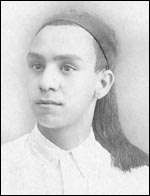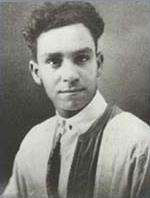Aboul-Qacem Echebbi
| Aboul-Qacem Echebbi | |
|---|---|
 | |
| Native name | أبو القاسم الشابي |
| Born |
24 February 1909 Tozeur, Tunisia |
| Died |
9 October 1934 (aged 25) Tunis |
| Occupation | poet |
Aboul-Qacem Echebbi (Arabic: أبو القاسم الشابي Abū al-Qāsim ash-Shābbī) (24 February 1909 - 9 October 1934) was a Tunisian poet. He is probably best known for writing the final two verses of the current National Anthem of Tunisia, Humat al-Hima (Defenders of the Homeland), that was written originally by the Egyptian poet Mustafa Sadik el-Rafii.
Life
Echebbi was born in Tozeur, Tunisia, on 24 February 1909, the son of a judge. He obtained his attatoui diploma (the equivalent of the baccalauréat) in 1928. In 1930, he obtained a law diploma from the University of Ez-Zitouna. The same year, he married and subsequently had two sons, Mohamed Sadok, who became a colonel in the Tunisian army, and Jelal, who later became an engineer.
He was very interested in modern literature in particular, and translated romantic literature, as well as old Arab literature. His poetic talent manifested itself at an early age and this poetry covered numerous topics, from the description of nature to patriotism. His poems appeared in the most prestigious Tunisian and Middle-Eastern reviews. His poem To the tyrants of the world became a popular slogan chant during the 2011 Tunisian and subsequently Egyptian demonstrations.[1] Echebbi died on 9 October 1934 at the Habib-Thameur Hospital in Tunis, Tunisia following a long history of cardiac disorders. His portrait is on the current 10 DT note. Echebbi was considered by later Egyptian literary critic Shawqi Daif to be among the very finest Arabic poets of the modern era.[2]
In late 2010 and 2011, Echebbi's poems became a source of inspiration for Arab protestors during the revolutions of the Arab Spring, which began with the Tunisian Revolution. Since then, there has been a revived interest in his work and his biography.

Works
- Ilā Ṭuġāt al-Ɛālam (To the tyrants of the world),
- Aġānī al-Ḥayāt (canticles of the life),
- Muđakkarāt (Memories),
- Rasā'il (A collection of letters),
- Ṣadīqī (A collection of seminars given to the Alumni Association of the college; caused quite a lot of controversy among
conservative literary groups)
Popular Poems
To the Tyrants of the World
Hey you, despotic tyrant, Darkness lover and enemy of life,
You scoffed at powerless people’s groans; And your hands are tainted with their blood.
You embarked on empoisoning the allure of existence and sowing prickles of grief in its horizons.
You will see! Don’t be deceived by spring time, Shining sky and morning light
For in the wide horizon lurk darkness fright, Thunder Rumble and stormy winds.
Woe betide you for flames are underneath ashes. Who grows prickles reaps wounds.
Have a look there… where you cut off The people’s heads and the flowers of hope;
You imbibed the heart of the earth with blood And made it drunk with tears.
The flood, of blood, will wipe you away, and the flaring gale will eat you up.
The Will To Live
If the people one day will to live then destiny must respond and the night must disappear and the chain must break. Those who never been cuddled by the passion of life will evaporate in its air and perish. So beware to those who don’t desire life from a slap of the victorious nothingness! Thus told me the living organisms And what their concealed souls reported to me. And the winds banged between the crevices on top of the mountains and underneath the trees. If I have the ambition to achieve a goal I will climb up my desire and forget any precaution. I don’t avoid the dangers of the routes or the blazing fireball. Those who don’t like climbing the mountains will live forever in holes. So, the youth’s blood has filled my heart, and other winds have roared in my chest. I pondered, listening to the rumble of thunder to the winds’ music and the rain’s cadence. And the earth told me when I asked: “O Mother do you hate humans?” “I bless those who have ambitions and those who enjoy taking risks and I damn those who don’t flow with the times and those who are complacent about life, life between the stones. The universe is alive, loves life And pities the dead no matter how glorious. The horizon won’t embrace dead birds, and the bees won’t kiss dead flowers. Were it not for the motherhood of my adoring heart those holes wouldn’t have embraced the dead. Beware those who beware to those who don’t desire life from a slap of the victorious nothingness!” On one autumn night filled with sorrow and ennui I got drunk from the night’s shining stars and I sang to sadness until it got drunk . I asked darkness: Will life come back to what the spring of life decays? But the darkness’s lips didn’t talk, nor did the virgins’ dawn croon. Then the forest told me in a lovely softness like the throbbing of strings. The winter comes, the foggy winter, the snowy winter, the rainy winter. Then extinguished will be the magic, the magic of the tree branches, the magic of the flowers and fruits, and the magic of the quiet, peaceful evening and the magic of the delicious and fragrant meadows. And the tree branches and leaves will fall and the flowers of a dear new succulent era. … The sacred chanting of life rang in the dreamy enchanted temple, and declared in the universe that ambition is the flame of life and spirit of glory. So if the souls will to live, then destiny must answer.
Humat al-Hima (Defenders of the Homeland)
O defenders of the Homeland! Rally around to the glory of our time! The blood surges in our veins, We die for the sake of our land. Let the heavens roar with thunder Let thunderbolts rain with fire. Men and youth of Tunisia, Rise up for her might and glory. No place for traitors in Tunisia, Only for those who defend her! We live and die loyal to Tunisia, A life of dignity and a death of glory. As a nation we inherited Arms like granite towers. Holding aloft our proud flag flying, We boast of it, it boasts of us, Arms that achieve ambitions and glory, Sure to realize our hopes, Inflict defeat on foes, Offer peace to friends. When the people will to live, Destiny must surely respond. Oppression shall then vanish. Fetters are certain to break.
National Anthem
| Arabic lyrics | Transliteration | English translation[3] |
|---|---|---|
|
|
|
See also
- Al-Tijani Yusuf Bashir, a Sudanese contemporary of Echebbi who also died at the age of 25
References
- ↑ All Things Considered (2011-01-30). "Tunisian Poet's Verses Inspire Arab Protesters". NPR. Retrieved 2012-02-14.
- ↑ Journal of the Middle East, vols. 4-6. Cairo: Markaz Buḥūth al-Sharq al-Awsaṭ of Ain Shams University, 1979.
- ↑ Tunisian National Anthem on NationalAntems.info
External links
| Wikimedia Commons has media related to Abou el Kacem Chebbi. |
- (Arabic) Aboul-Qacem Echebbi Website
- Website